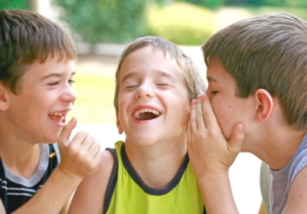Category — 2.5 Six to Eight: Social/Emotional Skills
Social/Emotional Skills
Children at this age are really trying hard to develop their social and emotional skills. They are trying to understand and label their emotions as well as those of others. They are also making new friends and learning the social skills needed to keep those friends. Friendships are important at this age and it is really important that we make sure children have the necessary skills to keep them (Fig. 1).
Figure 1. Friends
SOCIAL
Here are some signs of delay in the social domain:
- child appears not to have any friends;
- child does not seem to get invited to parties or outings that others are invited to;
- child always wants things done their way (closer to age 8);
- child appears to be quite dependent on others and may be clingy in certain situations;
- child does not like or want to share with others, even asked to;
- child does not seem to like to wait for her turn, even if asked to (closer to age 8);
- child does not seem to understand that one has to ask for permission when they want to use an item that does not belong to them;
- child chooses not to follow the rules at home or at school;
- child appears to get upset most of the time when playing simple card and board games with adults and peers (Fig. 2) (closer to age 8);
Figure 2. Playing chess
- child does not seem willing to cooperate with others;
- child refuses simple suggestions from others, even when struggling with a task;
- child does not appear to understand that what she likes is not necessarily what others like (closer to age 8);
- child does not appear to sense when others are upset or angry;
- child seems equally friendly with those she knows and those she does not know; for example, being willing to engage in lengthy conversations, hug and kiss and leave with anyone who they meet up on the street. (Then add Maya’s comment);
- child seems to fidget a lot, in social situations;
- child seems to prefer to be alone instead of with others most of the time;
- child does not seem to understand the facial expressions of others, according to one’s culture; for example, surprise, joy, sadness, anger;
- child does not join a group of children playing, unless asked to do so;
- child does not comfort others when they are sad;
- child hits;
- bites;
- kicks others most of the time when angry or within a conflict situation (instead of trying to find other ways to solve problem);
- child gets very angry when things do not go his or her way, or when he or she does not get what he or she wants.
EMOTIONAL
The emotional domain is very important. Children need to be secure, happy and full of self-confidence. Emotional skills also impact other developmental areas, specifically the cognitive and social domains. Children with good emotional skills will try harder and are more willing to learn. They are more likely to make new friends and keep them. It is very important that we monitor these skills, in order to offer help as early as possible if need be (Fig. 3).
Figure 3. Playing with others
A child may be experiencing delays in the emotional domain if he or she frequently:
- does not seem to be able to understand or label her own emotions (For example: “I am happy,” “I am angry”);
- cannot tell how others are feeling (closer to age 8);
- seems to rely on others a lot, even when performing the simplest of tasks (for example, seems to need constant encouragement from others);
- does not seem to like it when given negative feedback (closer to age 8) as in “you need to work a bit more on your reading”;
- has a very fragile self-esteem, and asks for reassurance a lot;
- is constantly asking significant others if they love him;
- seems to have trouble communicating how he/she is feeling;
- does not respond well to any change in routine (for example, may not like it if he is not read a story before bedtime, like he usually is);
- suddenly feels sick when asked to do something he/she does not want to do;
- will sometimes eat objects that are not edible (for example, play dough);
- will destroy his or others’ property when upset;
- is too scared to sleep alone;
- appears to have trouble getting to sleep or staying asleep;
- may take a long time to finish his/her meal;
- hurts him/herself on purpose;
- has excessive temper tantrums (that is, a temper tantrum that lasts for more than 10 minutes);
- appears to worry a lot over simple things and events;
- appears to be very difficult to comfort;
- seems to move from one extreme feeling to another very quickly (for example, goes from being very happy to very upset in just a few seconds).
see References
May 6, 2012 No Comments


